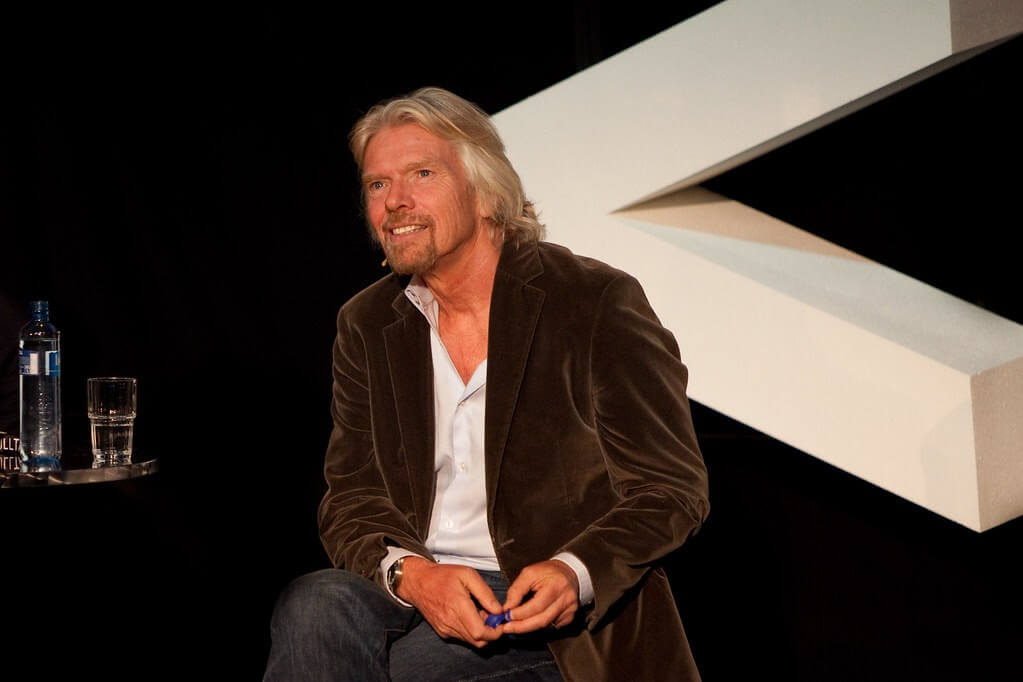When at age 15 Sir Richard Charles Nicholas Branson, future co-founder of the transnational corporation Virgin Group,launched a school magazine, as part of his protest against the war in Vietnam, a school headmaster gave him two options: leave school or wrap up the magazine. Branson chose to leave and the headmaster noted then that in the future he would either go to prison or become a millionaire. As it turned out, he was not mistaken.
Hates ties and says “yes” to every project
Branson is known for his passion for extreme travel, a penchant for adventurism, casual style in clothing, and a tendency to say yes to any project he encounters. When he was a boy his nickname was Letsgo. At Virgin, (VAH) his company, this morphed into Doctor Yes.
“Even if I have no idea where I’m going or how to get there, I prefer to say yes, instead of no. Opportunity favors the bold – this is a lesson that I learned early on, and have used to guide the Virgin (VAH) story. If somebody offers you an amazing opportunity but you are not sure you can do it, say yes – then learn how to do it later!”, Branson said in one of his interviews.
Branson’s business projects span from travel and leisure companies to telecoms and media enterprises; and from music and entertainment entities to financial services, health and wellness projects.
However, it was Virgin Airlines that helped to settle the Virgin (VAH) brand on the global map and enable him and his team to be brave in other areas, as Branson once said.
How one flight gave push to create Virgin Airlines?
During a peer-to-peer interview at the David Rubenstein Show, Richard Branson said that he came up with the idea of founding his airline during one of his flights.
Branson was trying to get from Puerto Rico to the Virgin Islands. After his flight was canceled, Branson hired a charter plane. He took a blackboard, wrote “Virgin Airlines One Way” and went to the other people that had been bumped off the flight.
He divided the cost of the plane by the number of seats and charged the stranded passengers $39 to rebook. As Branson remembers, one of the passengers then told him that he could be in the airline business. Branson then acquired an old Boeing 747 and began offering flights under the Virgin Atlantic brand name.
Branson’s idea was to bring some glamour and flair to air travel. In the late 80s, when Virgin Atlantic just started its journey, most of the airlines did not focus much on their customers’ needs due to low number of competitors on the market. People had enough money, but little choice which airline company to use to get from one place to another. Virgin Atlantic was one of the first airlines to target business class customers, offer sleeper seats, and premium economy cabins. The airline was among the first to introduce the concept of mood lighting to aircraft cabins, food ordering from the touch screen menu and comfortable adjustable white or black leather seats.
When the airline was trying to establish itself in the 1990s, British Airways, their main rival, ran what became known as the “dirty tricks” campaign. As Branson recalled on an episode of NPR’s “How I Built This” podcast, British Airways had a team of people accessing Virgin (VAH) computer information, ringing up their passengers and by pretending to be from Virgin, (VAH) telling them that flights were canceled and switching them onto BA. British Airways campaign ended up with a lawsuit from Branson.
Following two years of intense feuding, British Airways admitted making improper attempts to undermine its upstart competitor and agreed to settle the case by apologizing to Branson and paying out $945,000. Branson invested the money back into his Virgin Atlantic team.
In 1996, Virgin (VAH) group acquired the European short-distance carrier Euro Belgian Airlines and renamed it Virgin Express. Ten years later, the airline was merged with SN Brussels Airlines, formerly Sabena. The new company was called Brussels Airlines. Branson also founded Virgin Nigeria and Virgin America, which began flights from San Francisco International Airport in August 2007. Ten years later Alaska Airlines acquired Virgin America for $2.6-billion. In 2012, America’s Delta Air Lines bought a 49% stake in Virgin Atlantic carrier. The deal was presented as a direct response to the alliance between American Airlines (A1G) (AAL) and BA, which handed the two airlines 60% of the transatlantic market two years prior.
From skies to space
In 2004, Branson announced the launch of his new space tourism company Virgin Galactic. Virgin Group opened the world’s first private “spaceport” in the Sierra desert, New Mexico. The company planned to make flights using the reusable SpaceShipTwo spaceflight system – consisting of WhiteKnightTwo, a custom-built, four-engine, dual-fuselage jet carrier aircraft, and SpaceShipTwo, the world’s first passenger-carrying spaceship. Virgin Galactic (wholly owned by the Virgin Group) received applications for participation in suborbital flights from 500 potential tourists.
In an interview, Branson noted that he dreamed of admiring the Earth from outer space, having experienced acceleration from zero to three and a half thousand miles per hour in just 8 seconds, and experienced fivefold overloads. The first WhiteKnightTwo, VMS Eve, completed an extensive test flight program in 2008.
Like other passenger air carriers, Virgin (VAH) airlines have been heavily affected by the coronavirus pandemic. Both Virgin Atlantic and Virgin Australia planes remain largely grounded around the world. Branson started selling shares in Virgin Galactic venture to raise capital to assist other businesses. In one of its recent interviews, the company representative stated that Virgin (VAH) had enough capital to make it through the crisis and was still looking for new investment opportunities.
Did you like reading about Richard Branson? Who would you like to see featured next? Let us know in the comments below!

